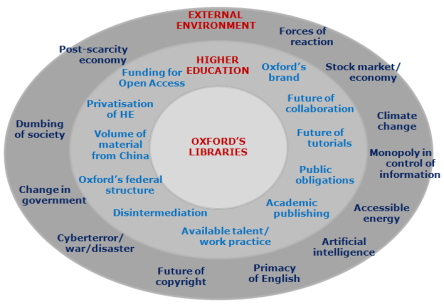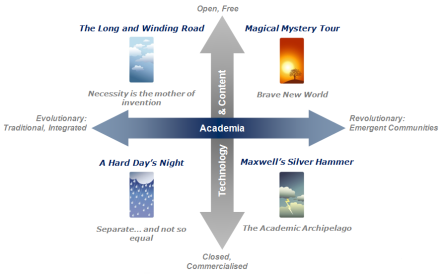Working at the University of Oxford involves an awful lot of specialist vocabulary and acronyms. On my first anniversary as a college librarian, here is my guide to what some of these mysterious words mean:
BA [Bachelor of Arts] – the degree awarded to undergraduates at Oxford, even if they studied Mathematics or Biological Sciences
Battels – a charge made to a member of college for accommodation or meals
Blue – a Blue is awarded to someone who has represented the University at sport
Bop – a college social event, typically involving dance and drink
Collections – college exams at the very beginning of a term. Sometimes they are for everyone on that course, others are only for those whose marks are dropping and need to prove they can do well and continue their studies
Eights Week – a rowing competition in Fifth Week of Trinity Term
Encaenia – annual ceremony in June at which honorary degrees are conferred
Fellows – the Senior Members or academic staff of a college
Formal hall – a meal held in college. Formal dress is usually expected. Don’t forget to pass the port to your left!
Graduation – ceremony at which degrees are conferred
High table – in a college, this is the table in the dining hall (often on a dais) at which the Fellows sit for meals
Hilary Term – the second term of the academic year, from January to March
JCR – the Junior Common Room: the body of undergraduate students in a college. The term can also mean their recreation room
Matriculation – ceremony at which students are formally admitted to membership of the University. At matriculation, and for all exams, students have to wear sub fusc
MCR – the Middle Common Room: the body of graduate students in a college. The term can also mean their recreation room
Michaelmas Term – the first term of the academic year, from October to December
Mods – this is short for Honour Moderations: exams taken in the first or second year by students in some subjects. The results are classed as First, Upper Second etc. See also Prelims
Oxford MA [Master of Arts] – if you have a BA from Oxford, you may apply for an MA in or after the 21st term after you matriculated (equivalent to 7 years after matriculating). You do not need to do any further study, you just have to pay a small fee. Someone with “MA (Oxon)” or “MA (Cantab)” has this type of Master’s degree
Oxford time – before railways (which necessitated national time in order to operate a timetable), local towns had their own time. Oxford Time is 5 minutes behind Greenwich Time. It is sometimes said that you may be up to 5 minutes late for a lecture or tutorial if you explain that you were operating on Oxford Time, not GMT, but I’m not promising that this excuse will work more than once
Oxford Union – not a students’ union, but a debating society. It even has its own library
Porters’ Lodge – the official entrance to a college, the Lodge is a combination of Reception and Security. One thing the Porters don’t do is carry anything
Prelims – exams taken in the first or second year by students in some subjects. The results are classed as Pass / Fail / Distinction. See also Mods
Punting – a punt is a flat-bottomed boat with a square bow, propelled by pushing against the riverbed with a pole. At Oxford, it is traditional to punt from the bow end (they do things differently in Cambridge). The best way to go punting is to get someone else to wield the pole while you relax on some cushions in the sun and enjoy a bottle of wine
Scouts – a scout works in a college, and their duties are primarily as a cleaner. In days gone by, the role of a scout was more like that of a footman or valet
SCR – the Senior Common Room: the body of Fellows in a college. The term can also mean the room where SCR members can drink tea or coffee, entertain visitors or read the newspaper
Sent down – this means the expulsion of a student from their college because of poor academic performance or for a disciplinary offence
Subfusc – formal attire worn by students and Fellows on formal occasions (such as matriculation, examinations and graduation). The clothes worn are dark in colour, and include an academic gown. For examinations, students also wear a carnation: white for the first exam, pink for exams in between and red for their final exam
Torpids – a rowing competition in Seventh Week of Hilary Term
Trinity Term – the third term of the academic year, from April to June
Tutorial system – each undergraduate has an hour-long tutorial each week, usually 1:1 with their tutor. They often have to prepare an essay or other written work for the tutorial, and the hour is spent in detailed examination of the student’s grasp of the subject and related reading
Do you know any other peculiar Oxford words? Let me know in the comments!

